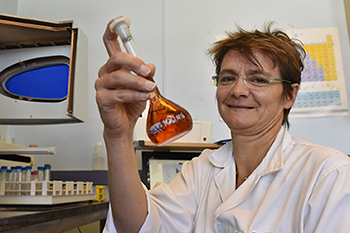Latest News Archive
Please select Category, Year, and then Month to display items
07 June 2019
|
Story Eugene Seegers
|
Photo Barend Nagel
 Tap on the red button labelled ‘Student Login’ at the bottom of the app to log in with your UFS student credentials.
Tap on the red button labelled ‘Student Login’ at the bottom of the app to log in with your UFS student credentials.
What? Your new KovsieApp is here!
How? Download this mobile app to your phone from the Apple App Store or Google Play Store.
Why? To access your information from the UFS website (current, registered students only ??).
It’s free! While you are connected to the on-campus Wi-Fi network.
Campus life just became a whole lot simpler. With the app, you can access personal information like study records, marks, class and exam timetables, mini fee statement, etc.
How to log in
Log in like this:
- Download the app, of course.
- Tap on the red button labelled ‘Student Login’ at the bottom of the app (see screenshot).
- Log in with your UFS student credentials.
- An OTP (one-time pin) will then be sent to the cellphone listed on your student profile. Do we have your correct number?
- Enjoy easy access to your personal UFS information with the KovsieApp! Unless…
… we don’t have your correct cellphone number. Please update your most recent contact number to get to your personal information in the app.
Updating your details
Please update your cellphone number by using the Student Self-service page on KovsieLife if you have trouble logging into or using the app.
Download Links
WATCH: Send the ravens!
UFS Ground Studies Laboratory receives accreditation to international standard
2016-03-18

Lore-Mari Deysel, Deputy-Director of the institute for Groundwater Studies.
Photo: Charl Devenish |
The Institute for Groundwater Studies (IGS) Laboratory at the University of the Free State is on equal footing with international testing labs. With its accreditation in March 2016 by SANAS (South African National Accreditation System), the IGS Laboratory now officially meets global standards.
Quality of water
The IGS Laboratory mainly analyses the quality of water samples. When it was originally established in 1989, the lab’s central function was to conduct testing for researchers at the institute itself. “After the public and water boards realised their need to analyse water samples, the IGS Laboratory expanded to deliver a service to these clients,” says Lore-Mari Deysel, Deputy-Director of the institute.
Since suppliers and regulatory authorities will not accept test or calibration results from a lab that is not accredited, the IGS initiated the accreditation process.
Accreditation to international standard
In order to be deemed technically competent and able to receive accreditation, labs must meet the ISO/IEC 17025 standard. ISO/IEC 17025 was first issued in 1999 by the ISO (International Organization for Standardization) and the IEC (International Electrotechnical Commission).According to Deysel, this is the single most important standard for calibration and testing laboratories around the world.
“Laboratories that are accredited to this international standard have demonstrated that they are technically competent and able to produce precise and accurate test and/or calibration data. Furthermore, it demonstrates that the university has the capacity to supply valuable and reliable services alongside the academy,” Deysel says.